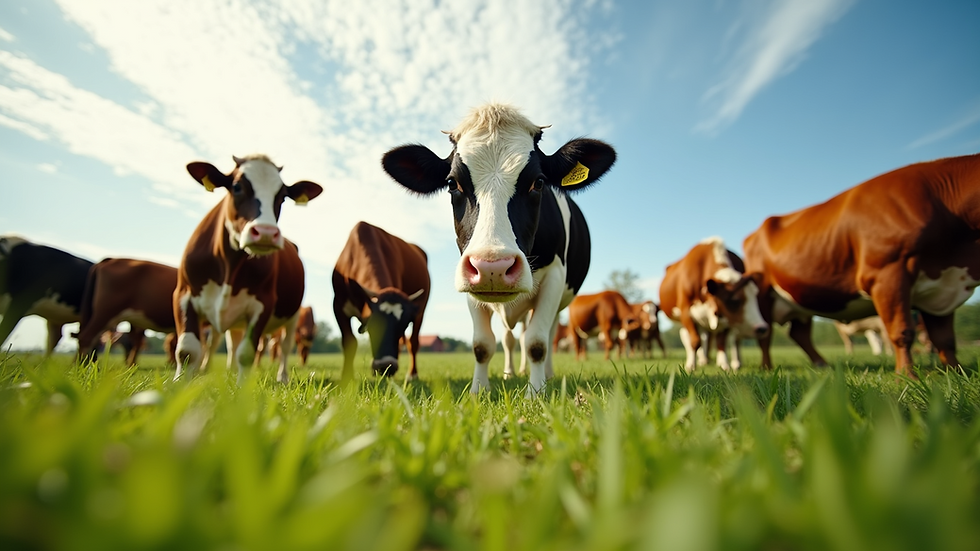How Grass-Fed Beef Supports Sustainable Farming
- Tim Geauvreau

- Oct 6, 2025
- 4 min read
When I first started working with local farmers to bring naturally raised meats to your door, I quickly realized how important grass-fed beef is for sustainable farming. It’s not just about better taste or healthier meat; it’s about supporting a system that cares for the land, animals, and communities. Let me take you through why grass-fed beef matters and how it helps create a more sustainable future for farming.
What Makes Grass-Fed Beef Different?
Grass-fed beef comes from cattle that eat only grass and forage throughout their lives. Unlike conventional beef, which often involves grain feeding in feedlots, grass-fed cattle graze on pastures. This difference in diet and lifestyle has a big impact on the environment and the quality of the meat.
Grass-fed cattle tend to live in more natural conditions. They roam freely on pastures, which helps maintain healthy soil and ecosystems. This natural grazing mimics the way wild herbivores have interacted with the land for centuries. It encourages biodiversity and reduces the need for chemical fertilizers and pesticides.

By choosing grass-fed beef, you’re supporting farmers who prioritize animal welfare and environmental health. These farmers work hard to maintain pastures that are rich in nutrients and free from harmful chemicals. This approach not only benefits the cattle but also helps keep the land healthy for future generations.
How Grass-Fed Beef Supports Sustainable Farming Practices
Sustainable farming is all about balancing productivity with environmental care. Grass-fed beef fits perfectly into this balance because it promotes several key sustainable practices:
Soil Health Improvement: Grazing cattle stimulate plant growth and help cycle nutrients back into the soil. Their manure acts as a natural fertilizer, enriching the earth without synthetic chemicals.
Carbon Sequestration: Healthy pastures can capture and store carbon dioxide from the atmosphere. This helps reduce greenhouse gases and combat climate change.
Water Conservation: Grass-fed systems often use less water than grain-fed operations because they rely on natural rainfall and pasture growth.
Biodiversity Support: Grazing encourages a variety of plants and insects to thrive, creating a more resilient ecosystem.
Farmers who raise grass-fed cattle often rotate their herds between pastures. This practice prevents overgrazing and allows the land to recover. It’s a simple but effective way to keep the soil fertile and the environment balanced.

If you want to support these sustainable methods, buying grass-fed beef from local farmers is a great place to start. It helps keep small farms alive and encourages more responsible land management.
The Nutritional Benefits of Grass-Fed Beef
Besides being better for the planet, grass-fed beef is also better for you. It contains higher levels of important nutrients compared to conventional beef. Here’s what makes it stand out:
More Omega-3 Fatty Acids: These healthy fats support heart and brain health.
Higher in Antioxidants: Grass-fed beef has more vitamin E and other antioxidants that help protect your cells.
Better Fat Profile: It has less total fat and more conjugated linoleic acid (CLA), which may have health benefits.
Rich in Vitamins and Minerals: Including vitamin A, zinc, and iron.
Eating grass-fed beef means you’re getting meat that’s not only delicious but also packed with nutrients that support your well-being. It’s a win-win for your health and the environment.

How We Work with Local Farmers to Bring You the Best
Our small business is passionate about connecting you with the best naturally raised meats. We partner with local farmers who raise their cattle on open pastures, following sustainable and humane practices. This means you get fresh, high-quality grass-fed beef delivered right to your door.
We believe in transparency and trust. That’s why we visit the farms regularly, meet the farmers, and see firsthand how the animals are cared for. We want you to feel confident that your meat comes from a source that respects the land and the animals.
If you’re interested in trying some of the finest ontario grass-fed beef, we’re here to help. Supporting local farmers means supporting your community and the environment.
Simple Ways You Can Support Sustainable Farming Today
You don’t have to be a farmer to make a difference. Here are some easy steps you can take to support sustainable farming through your food choices:
Choose Grass-Fed Beef: Look for labels or ask your local butcher about grass-fed options.
Buy Local: Supporting local farmers reduces transportation emissions and strengthens your community.
Cook Mindfully: Use the meat you buy thoughtfully to reduce waste.
Learn and Share: Educate yourself and others about the benefits of sustainable farming.
Get Involved: Visit farms, farmers markets, or join community-supported agriculture (CSA) programs.
Every small action adds up. By choosing grass-fed beef, you’re helping create a healthier planet and a more sustainable food system.
Bringing It All Together
Grass-fed beef is more than just a tasty choice. It’s a way to support farmers who care deeply about the environment and animal welfare. By choosing grass-fed beef, you’re helping improve soil health, reduce carbon emissions, and promote biodiversity. Plus, you get to enjoy meat that’s rich in nutrients and flavor.
Our commitment to working with local farmers means you can trust the quality and sustainability of the beef you receive. Together, we’re building a better future for farming and for all of us who enjoy good food.
Thank you for being part of this journey toward sustainable, naturally raised meats. Your choices truly make a difference.




Comments